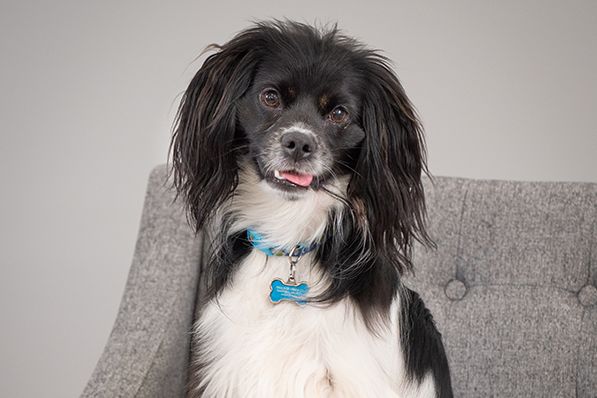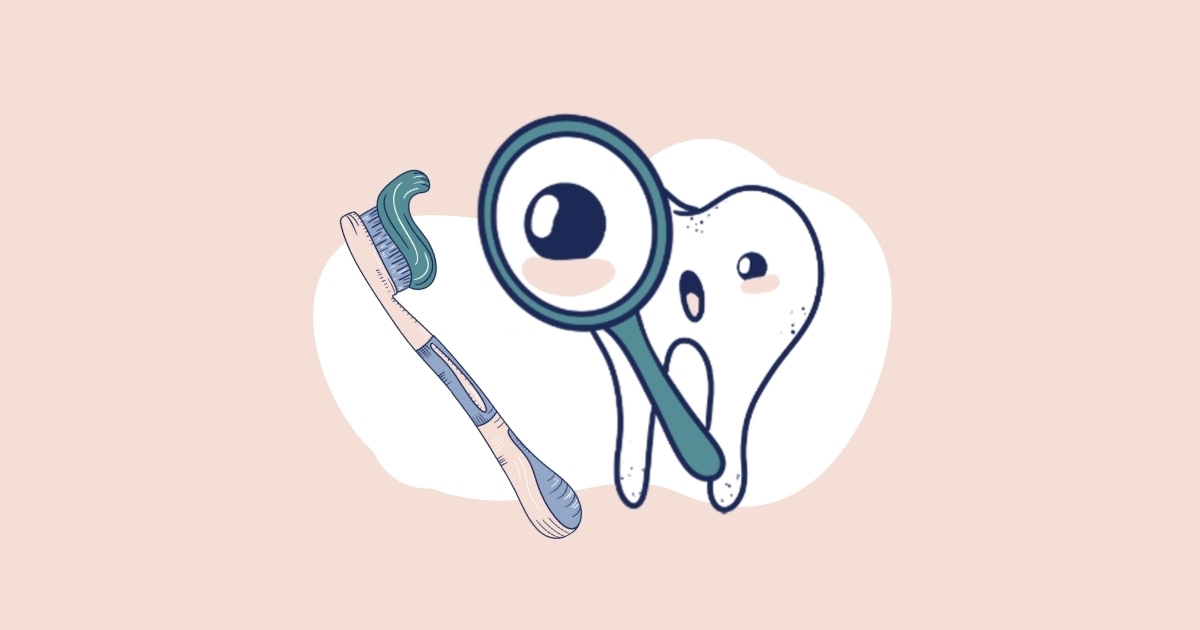If you’ve visited Bass Dentistry, you’re probably familiar with a friendly black and white spaniel named Fender.
Although he has four legs, a tail, and no training in dentistry, he’s an invaluable member of the team. Why? Fender is our certified therapy dog.
His eager face and calm demeanor bring comfort to patients of all ages who may be struggling with anxiety during their dental appointments. Patients have found that the warm weight of a furry friend laying with them in the dental chair can reduce stress, lower their heart rate, and make their visit more pleasant overall. Let’s learn more about what a certified therapy dog is, how therapy dog certification works, and the benefits of having a therapy dog in a clinical setting.
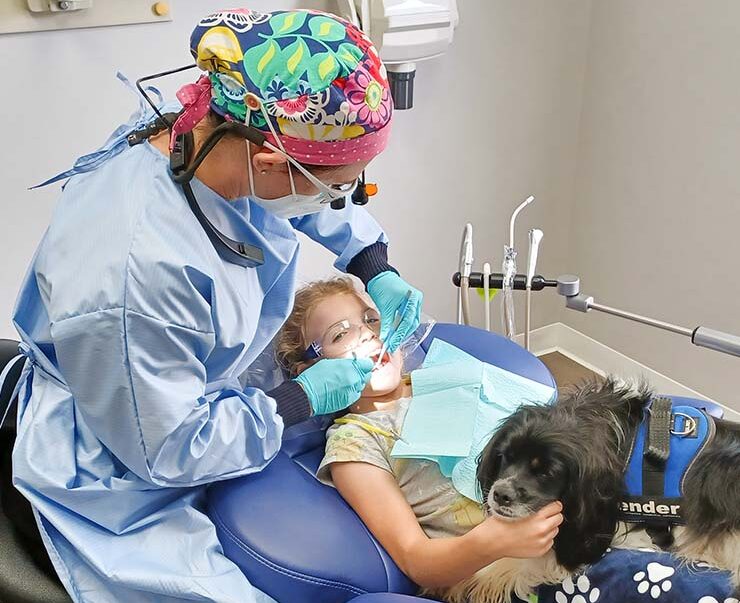
What is a Therapy Dog?
While it may seem unusual to have an animal in a clinical setting, the use of therapy dogs is becoming more common. Certified therapy dogs like Fender play a helping role. They provide comfort, affection, and calm in clinical settings like hospitals, hospices, nursing homes, mental health facilities, and even dental offices. Trained therapy dogs are comfortable being handled by unfamiliar people in unfamiliar settings, indifferent to strange noises, and calm in most situations. Above all, therapy dogs have a natural affinity for people. They volunteer their services as a team with their human handler.
Dr. Bass and Fender work together to help reduce anxiety. Dental anxiety is not unusual, and it can deter people from regularly seeing the dentist. We want our patients to feel informed and as relaxed as possible in our care. One way we do that is by talking our patients through every procedure ahead of time and thoroughly answering their questions. Providing access to a therapy animal is another. If Fender can make visiting the dentist a little more enjoyable, we’re all for it!
It’s important to know that certified therapy dogs and service dogs are not the same things. Both animals perform helping roles, but service dogs are specifically trained to support people with disabilities. For example, service dogs can recognize the signs of a seizure, fetch items that their handler can’t reach, serve as guide or hearing animals, or help people on the autism spectrum distinguish important sensory signals. On the other hand, therapy dogs work with a broad range of people in nearly any setting, and their primary role is providing comfort.
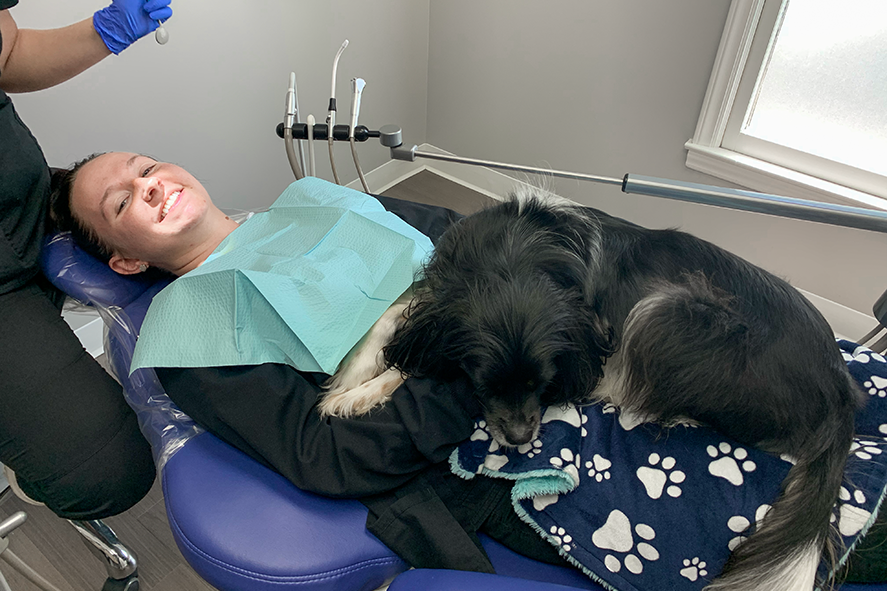
Therapy Dog Certification
Therapy dogs are required to have certification and registration with a reputable national organization. Certification requires the dog to meet behavior criteria such as listening and obeying commands from their handler, sitting calmly while being touched, lack of aggression toward people and other dogs, and leash training, in addition to having an excellent temperament. The dog’s handler must also complete an examination since the two work as a team.
Fender is certified through Invisible Paw Prints (IPP), an all-volunteer, non-profit organization based in Charlotte. Founded by Rob Kortus in 2016, IPP’s mission is to provide “heartwarming visits in support of local community organizations.” Certification through Invisible Paw Prints requires the dog to be at least six months old, though Fender was allowed an exemption to start the process at four months old. The exam takes less than an hour, but not every dog has the right temperament to become certified. Once certified, dogs and handlers are required to commit to volunteering in the community a minimum of six times per year. You can find teams from IPP working in nursing homes, hospitals, and other settings where therapy dogs are beneficial.
With Dr. Bass’s help, Fender also received his AKC Canine Good Citizen Certification (GCC). GCC is a ten-skill training program that focuses on teaching the basics of good manners and obedience, instilling the values of responsible ownership, and strengthening the bond between humans and their canine companions at home and out in the community. It really is a team effort!
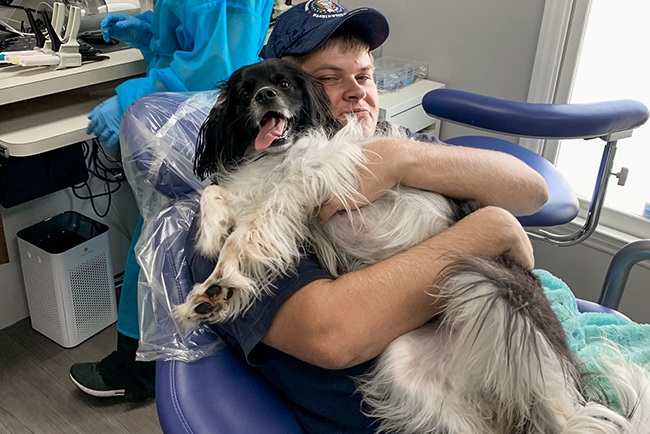
Why We Introduced a Therapy Dog into our Business
Our sweet Fender showed signs of being an excellent therapy dog early on. Dr. Bass began bringing him to work when he was about eight weeks old, expecting that he would spend his days hanging out in her office. Fender soon showed his love for being around people and falling asleep in laps. His happy, relaxed, and affectionate demeanor calmed everyone who interacted with him. Dr. Bass decided it was time to investigate getting Fender certified as a therapy dog.
Before opening her own practice, Dr. Bass worked extensively with special needs patients in an emergency room setting. These patients often had intense anxiety and other disabilities that required special, thoughtful care. Dr. Bass was very aware that both disabled and non-disabled patients frequently experience dental anxiety, whether or not they’re in an emergency situation. The calming distraction of a friendly animal often helps diffuse anxiety. That knowledge, coupled with her concentration in Animal Behavior in college, encouraged her to introduce a certified therapy dog into her practice.
Additionally, the presence of a therapy dog provides a calming alternative to full sedation dentistry. While the idea of being unconscious for your dental exam may seem appealing, sedation dentistry is not always an option or affordable for every patient. Alternatives like therapy animals, weighted blankets, and listening to music via headphones are often more practical and just as effective in reducing anxiety during a routine visit.
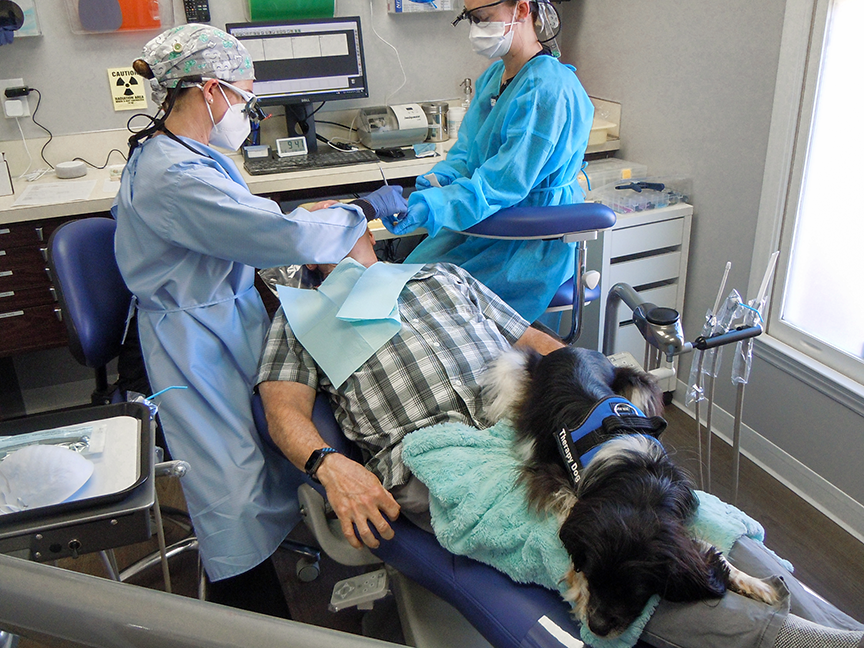
Benefits of a Therapy Dog in Dental Care
As Dr. Bass says, “Everybody loves the dog, but not everybody loves going to the dentist.”
One of the benefits of having a certified therapy dog in dental care is simply creating a positive experience for patients. When patients know there is an alternative to keeping their anxiety bottled up or avoiding the dentist entirely, they’re more likely to seek regular dental care.
Additionally, interaction with therapy dogs has been proven to lower blood pressure, reduce the overall perception of pain, and improve mood. Petting a dog provides automatic relaxation, and the presence of a dog may encourage better communication. The therapy dog teams from Invisible Paw Prints see these benefits in real time every day – we see it in our office, too.
Dr. Bass says that dental anxiety was not a topic covered in dental school, but it’s something every dentist confronts daily. Having Fender as part of the team allows her to acknowledge the reality of dental anxiety and offer a cuddly solution to the problem. Patients of all ages request Fender’s company during appointments, and the feedback has been overwhelmingly positive.
Fender's Raving Fans
“…Fender, the therapy dog, is far too adorable and sweet; having him on my lap to pet makes the appointments fly by. If you like great dental care be sure to [visit Bass Dentistry].”
“Dr. Bass & staff are the greatest! And seeing Fender was awesome!❤❤❤”
“…Family-friendly staff and environment. They have a therapy dog!!! So if you have kids (no matter what age) that have a little dentist appointment induced anxiety, search no further, THIS IS YOUR PLACE!!!”
Certified therapy dogs like Fender are an asset to modern dentistry, and we are proud to have him on our team. His ability to provide a calm and comfortable experience while we care for your teeth is just one of the benefits. When you schedule your next appointment with Bass Dentistry, request a slot with Fender. He’ll be happy to share your lap!
Learn more about the therapy dog training we went through with Fender. Invisible Paw Prints is a 501(c)(3) non-profit organization fully operated by volunteers. Consider a gift to support them as they continue to make an impact throughout the community.
Healthy Gums,
Healthy Life
If dental health is important to you and your family, take steps to know how to keep your gums healthy. Gum health is essential to maintaining healthy teeth and overall good dental hygiene. Brush and floss multiple times per day, avoid tobacco products, and use a therapeutic mouthwash.
If you want to know more about maintaining a healthy smile, book an appointment today with Bass Dentistry in Gastonia, NC.

